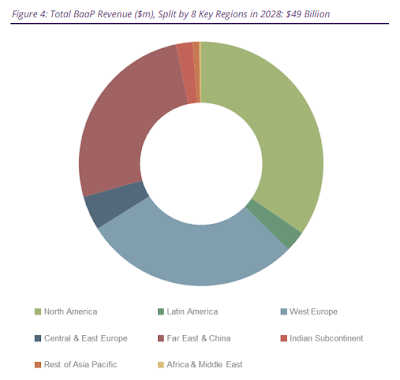Banks that adopt Artificial Intelligence (AI) to enable better customer success and business experience are moving towards a Banking-as-a-Platform (BaaP) operating model to fuel new digital revenue growth.
The main strategic goal of a Platform banking business model is to become involved in strategic Fintech partnerships which can improve their product offering for both retail and corporate clients.
Each platform is largely self-contained in producing business and technology outcomes, and autonomous in prioritizing its work to meet growth goals and clearly defined areas of specialization.
BaaP Market Development
According to the latest worldwide market study by Juniper Research, global revenue from BaaP services will increase to $49 billion globally in 2028 -- that's up from $4 billion in 2023.
BaaP can help traditional banks regain their competitive edge against NeoBanks. Through collaboration with innovative vendors, traditional banks can offer new services from partners, including embedded insurance, lifestyle offers with leading brands, or access to human resource services for small businesses.
Juniper Research defines BaaP as a business model that enables third-party partners to build products and services for bank customers, most commonly a technology company that can provide APIs while the bank manages data exchange, oversees authentication and ensures compliance.
Juniper analysts believe that banks can utilize partnerships with industry leaders to build upon their core banking model -- helping them compete with Fintech startups by offering more user-friendly services.
Compared with traditional acquisitions, BaaP partnerships are highly flexible and can be easier to integrate, as banks transition to API-focused models. By offering a wide range of services via BaaP, legacy banks can gain a competitive edge without having to stray from their core business.
According to Juniper, marketplaces are the most effective way for banks to adapt to the digital business arena -- helping them create financial services ecosystems that offer personalized customer experiences, without developing services themselves.
For example, Revolut has extensively expanded its lifestyle offerings in-app, thereby creating its own ecosystem of services, without taking on the costs traditional banks have faced in expanding services.
In turn, customers benefit from innovative solutions that are tailored to their needs, essentially increasing satisfaction and improving the stickiness of their banking relationships.
Outlook for BaaP Application Growth Trends
Juniper analysts recommend that banks evaluate which services are core, and which services can be replaced by working with innovative third parties -- enabling banks to improve services being offered, while reducing costs in a difficult economic climate.
That said, I believe these are a few of the many market opportunities that are expected to emerge in the BaaP market in the coming years. As the BaaP market continues to grow, we can expect to see even more innovation and competition in the banking industry.
This innovation and growth will ultimately benefit banking consumers, who will have access to a wider range of products and services at better prices. It will also raise the bar of expectations for Fintech startups. Direct competition does that, most effectively.
